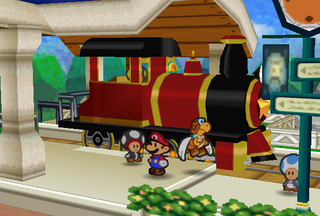K64: Difference between revisions
(Incorporated trivia) |
Power Flotzo (talk | contribs) No edit summary |
||
| (One intermediate revision by one other user not shown) | |||
| Line 3: | Line 3: | ||
'''K64''' is a steam locomotive on the railway lines ([[Dry Dry Railroad]]) between [[Toad Town]] and the station at [[Mt. Rugged]] in ''[[Paper Mario]]''. Its name is a reference to the [[Nintendo 64]] (which is abbreviated as "N64") and is mentioned on the back of the [[Toad Town News]] board after Chapter 1. [[Mario]] has to take the train to Mt. Rugged in order to proceed to [[Dry Dry Desert (Paper Mario)|Dry Dry Desert]]. To access the train, he first must destroy a rock blocking the railway lines with [[Bombette]]. Mario is then able to use the railways free of charge. | '''K64''' is a steam locomotive on the railway lines ([[Dry Dry Railroad]]) between [[Toad Town]] and the station at [[Mt. Rugged]] in ''[[Paper Mario]]''. Its name is a reference to the [[Nintendo 64]] (which is abbreviated as "N64") and is mentioned on the back of the [[Toad Town News]] board after Chapter 1. [[Mario]] has to take the train to Mt. Rugged in order to proceed to [[Dry Dry Desert (Paper Mario)|Dry Dry Desert]]. To access the train, he first must destroy a rock blocking the railway lines with [[Bombette]]. Mario is then able to use the railways free of charge. | ||
In ''[[Paper Mario: The Thousand-Year Door]]'', a model of K64 is in the [[Poshley Heights]] house next to the hotel. In the | In ''[[Paper Mario: The Thousand-Year Door]]'', a model of K64 is in the [[Poshley Heights]] house next to the hotel. In the [[Paper Mario: The Thousand-Year Door (Nintendo Switch)|Nintendo Switch remake]], pictures of K64 have been added to the house, [[Professor Frankly]]'s house, and [[Riverside Station]]. The picture inside Professor Frankley's house depicts him standing in front of the train. | ||
K64 is similar to the [[train (obstacle)|trains]] that appear in [[N64 Kalimari Desert|Kalimari Desert]] from ''[[Mario Kart 64]]''. The background music that plays while Mario rides the train is an arrangement of the music from Kalimari Desert as well. | K64 is similar to the [[train (obstacle)|trains]] that appear in [[N64 Kalimari Desert|Kalimari Desert]] from ''[[Mario Kart 64]]''. The background music that plays while Mario rides the train is an arrangement of the music from Kalimari Desert as well. | ||
| Line 22: | Line 22: | ||
[[Category:Paper Mario]] | [[Category:Paper Mario]] | ||
[[de:K64]] | [[de:K64]] | ||
[[it:K64]] | |||
Latest revision as of 17:12, October 1, 2024
- “The train parked at the station at the south of town is pretty spiffy, isn't it? It's called K64.”
- —A railroad lover, Paper Mario
K64 is a steam locomotive on the railway lines (Dry Dry Railroad) between Toad Town and the station at Mt. Rugged in Paper Mario. Its name is a reference to the Nintendo 64 (which is abbreviated as "N64") and is mentioned on the back of the Toad Town News board after Chapter 1. Mario has to take the train to Mt. Rugged in order to proceed to Dry Dry Desert. To access the train, he first must destroy a rock blocking the railway lines with Bombette. Mario is then able to use the railways free of charge.
In Paper Mario: The Thousand-Year Door, a model of K64 is in the Poshley Heights house next to the hotel. In the Nintendo Switch remake, pictures of K64 have been added to the house, Professor Frankly's house, and Riverside Station. The picture inside Professor Frankley's house depicts him standing in front of the train.
K64 is similar to the trains that appear in Kalimari Desert from Mario Kart 64. The background music that plays while Mario rides the train is an arrangement of the music from Kalimari Desert as well.
Names in other languages[edit]
| Language | Name | Meaning | Notes |
|---|---|---|---|
| Chinese | 神游号[1] Shényóu hào |
iQue;「号」(hào) is a suffix used for vehicles and ships |
